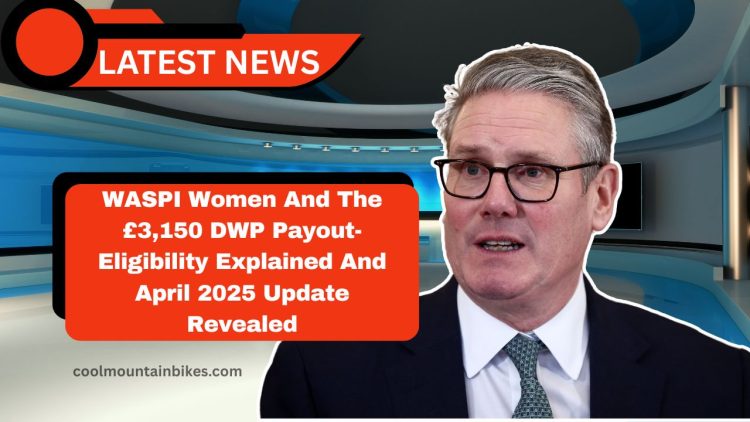The £3,150 WASPI compensation debate has reignited in 2025 as millions of UK women born in the 1950s continue to seek justice for the government’s state pension age changes.
Despite recommendations from the Parliamentary and Health Service Ombudsman (PHSO), the Department for Work and Pensions (DWP) has announced no compensation will be issued, prompting a renewed wave of public outcry and political scrutiny.
Understanding the WASPI Campaign
The Women Against State Pension Inequality (WASPI) campaign represents women affected by increases in the state pension age without sufficient notice.
Originally planned to retire at 60, many were abruptly informed they’d have to wait until age 65 or 66, creating financial hardship and emotional stress.
The roots of this issue date back to the 1995 Pensions Act, with further acceleration in 2011. The key problem: many women claim they were not adequately notified, preventing them from adjusting retirement plans.
Parliamentary Ombudsman Findings & Recommendations
In 2021, the PHSO ruled the DWP guilty of maladministration, noting it failed to properly communicate changes.
The Ombudsman recommended compensation levels ranging from £1,000 to £2,950—some estimates now push the upper range to £3,150 for severely impacted individuals.
Yet, despite mounting pressure, the government officially declined to implement any compensation scheme as of April 2025, citing budget constraints and claims that most women had ample notice.
Proposed WASPI Payment Overview
| Category | Details |
|---|---|
| Maximum Recommended Amount | Up to £3,150 per woman |
| Eligibility Birth Dates | April 6, 1950 – April 5, 1960 |
| Status of Government Payment | No official compensation planned |
| Cause for Compensation | Inadequate communication about pension changes |
| Potential Legal Action | Being considered by WASPI group |
Who Could Be Eligible?
If future governments or courts reverse the decision, the eligibility criteria may include:
- Women born between April 6, 1950 and April 5, 1960
- Those not properly informed about pension age changes
- Individuals who suffered financial or emotional hardship as a result
Many women had structured retirement plans assuming they could retire at 60. When told they must wait additional years, it led to loss of income, employment challenges, and disrupted life plans.
Government’s Current Position – April 2025
As of the latest update, the UK government maintains its position against implementing compensation, stating that a large-scale payout scheme would be financially unsustainable.
Officials argue that most affected individuals had time to adjust and that no further financial support is warranted.
This response has drawn criticism from:
- Opposition political parties
- Members of Parliament across party lines
- Advocacy organizations and public commentators
Despite this, there’s no legislative commitment from major parties, including Labour, to reverse the decision—leaving the matter in limbo.
Next Steps for Affected Women
Though compensation has not been approved, affected women are encouraged to remain proactive:
- Stay Informed: Regularly visit the WASPI official website for campaign updates.
- Engage Politically: Reach out to local MPs and request they support the campaign.
- Join Legal Action: The WASPI group is exploring legal avenues to challenge the government’s refusal.
Legal action may require claimants to submit impact statements, register with advocacy groups, or participate in class-action initiatives if formally launched.
What Could Happen Next?
While there’s no guarantee of future compensation, public pressure and legal challenges could shift the narrative.
Historic decisions in similar high-profile public justice cases have seen reversals or settlements after persistent advocacy.
The current climate suggests that although April 2025 won’t see payments issued, the fight is far from over.
The £3,150 WASPI payment remains a symbol of the broader struggle for transparency and fairness in government pension policy.
Despite the lack of a confirmed payout in April 2025, affected women are not giving up. The legal fight, political lobbying, and public advocacy continue, keeping the issue alive and on the national agenda.
The coming months may be pivotal—either reaffirming the government’s stance or forcing a reconsideration through political or judicial pressure.
Until then, the WASPI campaign remains a beacon of resilience for millions still demanding justice.
FAQs
Is the £3,150 WASPI payment confirmed by the government?
No. As of April 2025, the government has rejected the recommendation to issue any form of WASPI compensation.
Who would qualify for the WASPI payout if approved in the future?
Women born between April 6, 1950 and April 5, 1960, who were not properly notified of pension age changes and faced financial hardship.
What can affected women do now?
Affected individuals can stay updated, contact MPs, support the WASPI movement, and prepare for potential legal proceedings.

